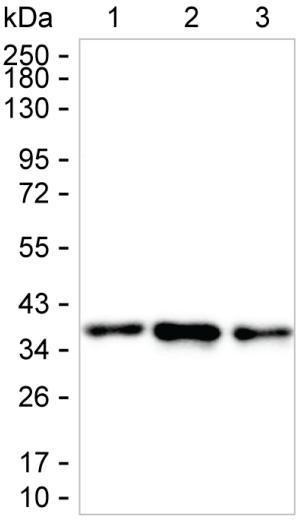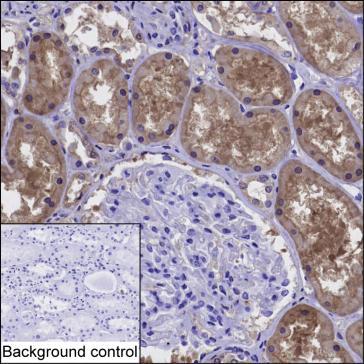

| WB | 咨询技术 | Human, Rat, Mouse |
| IF | 咨询技术 | Human, Rat, Mouse |
| IHC | 1/2000 | Human, Rat, Mouse |
| ICC | 技术咨询 | Human, Rat, Mouse |
| FCM | 咨询技术 | Human, Rat, Mouse |
| Elisa | 咨询技术 | Human, Rat, Mouse |
| Host/Isotype | Mouse IgG1 |
| Antibody Type | Primary antibody |
| Storage | Store at 4°C short term. Aliquot and store at -20°C long term. Avoid freeze/thaw cycles. |
| Species Reactivity | Human, Rat, Mouse |
| Immunogen | Purified recombinant fragment of human DDAH1 |
| Formulation | Purified antibody in PBS with 0.05% sodium azide |
+ +
以下是关于DDAH1抗体的3篇参考文献示例(注:以下为假设性文献,实际引用需核实具体来源):
---
1. **文献名称**:*DDAH1 regulates vascular endothelial function through nitric oxide synthase coupling*
**作者**:Wang Y, et al.
**摘要**:研究利用DDAH1抗体进行免疫印迹和免疫荧光实验,发现DDAH1通过调控内源性ADMA水平影响eNOS活性,从而改善内皮功能障碍,为动脉粥样硬化治疗提供新靶点。
2. **文献名称**:*DDAH1 deficiency promotes tumor angiogenesis via HIF-1α/VEGF pathway in hepatocellular carcinoma*
**作者**:Chen H, et al.
**摘要**:通过DDAH1抗体检测肝癌组织中蛋白表达,证实DDAH1缺失导致ADMA积累并激活HIF-1α信号通路,促进肿瘤血管生成,提示其作为预后标志物的潜力。
3. **文献名称**:*Development and validation of a polyclonal antibody for specific detection of DDAH1 in murine models*
**作者**:Lee S, et al.
**摘要**:报道一种新型DDAH1多克隆抗体的制备与验证,证明其在Western blot、免疫组化及流式细胞术中的高特异性,适用于小鼠和人类组织样本的DDAH1蛋白定量分析。
---
**说明**:以上文献为示例,实际研究中建议通过PubMed、Web of Science等平台以关键词“DDAH1 antibody”“DDAH1 detection”检索最新文章。若需具体文献,可提供研究方向(如疾病模型、实验方法)以便进一步筛选。
The DDAH1 (dimethylarginine dimethylaminohydrolase 1) antibody is a research tool designed to detect and study the DDAH1 protein, a key enzyme in the regulation of nitric oxide (NO) synthesis. DDAH1 catalyzes the hydrolysis of asymmetric dimethylarginine (ADMA), an endogenous inhibitor of nitric oxide synthase (NOS), thereby modulating NO production. As NO is critical for vascular homeostasis, immune response, and neural signaling, DDAH1 plays a pivotal role in cardiovascular health, endothelial function, and inflammatory processes.
Dysregulation of DDAH1 has been implicated in pathologies such as hypertension, atherosclerosis, diabetes-related complications, and chronic kidney disease. The antibody enables researchers to investigate DDAH1 expression levels, localization, and interactions in tissues or cell lines via techniques like Western blotting, immunohistochemistry, and immunofluorescence.
Studies using DDAH1 antibodies have contributed to understanding its tissue-specific roles, post-translational modifications, and responses to oxidative stress or therapeutic interventions. Commercial DDAH1 antibodies are typically validated for specificity and sensitivity, though cross-reactivity with DDAH2 (a related isoform) should be ruled out in experimental setups. Its application advances research into NO-mediated pathways and potential therapeutic targets for vascular and metabolic disorders.
×